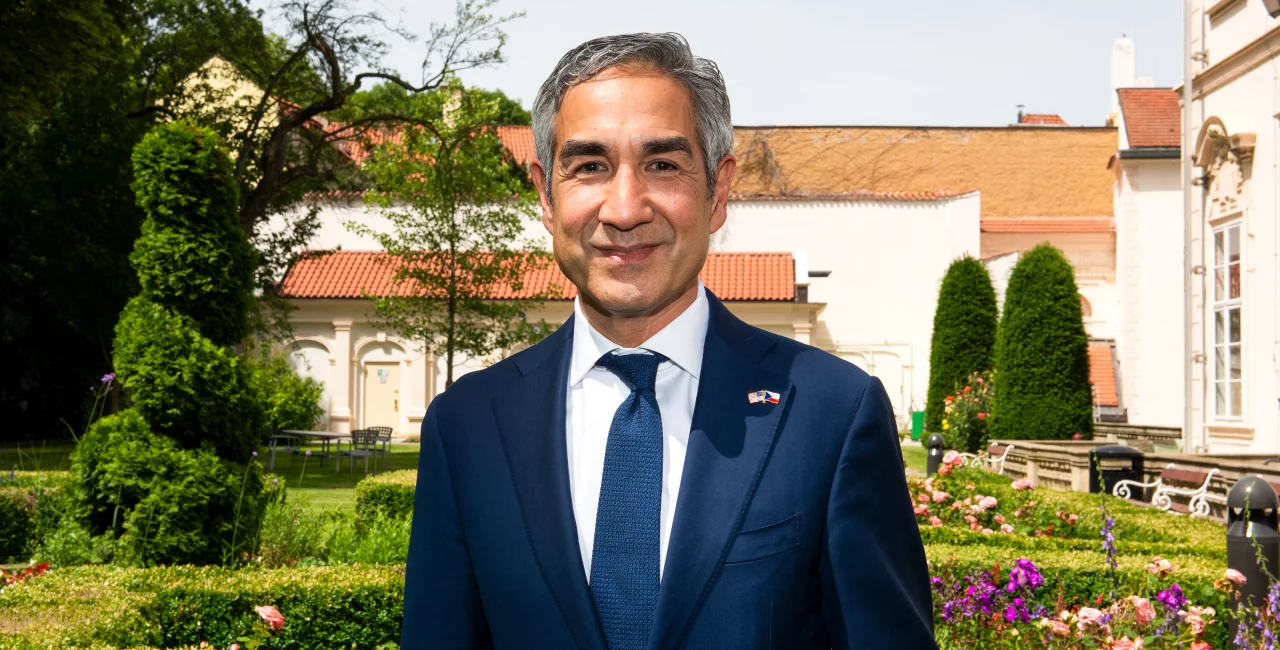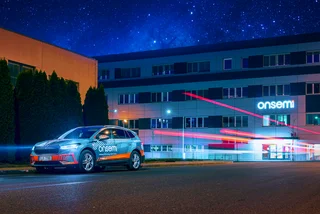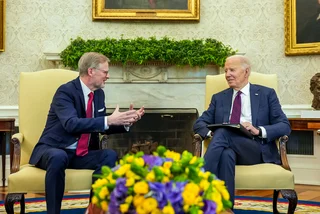During Czech Prime Minister Petr Fiala’s recent visit to the White House, American President Joe Biden described Czechia as a “great ally,” claiming the two nations have “only grown closer and stronger.” Czechia’s leading role in the Western response to Russia’s invasion of Ukraine has highlighted to the world the transformation the country has seen in almost 35 years of democracy.
What does this transformation mean for the future of Czech-U.S. relations, and what opportunities does it bring to Americans in Czechia? Expats.cz sat down with U.S. Ambassador Bijan Sabet at the U.S. Embassy in Prague’s Malá Strana to find out.
This interview has been edited for clarity and length.
How does the U.S. embassy serve American citizens in Czechia?
We’re focused on two things. We support all Americans in Czechia, whether residents, visitors, business travelers, or students, on matters ranging from helping those who lose their passports to more challenging issues. We also aim to strengthen U.S.-Czech ties across several areas: our political relationship, shared defense, economic, and cultural ties.
I’ve been the ambassador for around 18 months. Our relationship is positive and productive in many areas, and our ties have never been stronger.
Could you describe your background before becoming an ambassador?
I worked in the tech sector for most of my career, starting as a tech entrepreneur and then acting as a tech investor in start-ups.
About a third of our country’s ambassadors come from the private sector. The prior four U.S. ambassadors in Czechia came from the private sector, from very different backgrounds, but they all had one thing in common: they loved their experience here and felt privileged to serve in this country. When the president said he wanted me in Prague, I was over the moon.
Can you bring your individual experiences and interests to your work?
I represent the president; his policy and agenda are my work. At the same time, ambassadors are expected to bring their own experiences and energy.
A key part of my role is to listen. I spend a lot of time in Prague and the regions, listening to what people are concerned about, their challenges and aspirations, and what we can do to be a better partner. I also attend events focusing on our shared history and values, ranging from the Liberation Festival in Plzeň to Prague Pride.
You mentioned Prague Pride – is advancing LGBTQ+ rights a priority topic for the U.S. in Czechia?
President Biden firmly believes in full equality worldwide, an area where we can all do better. We have been involved with Prague Pride since its inception. Last year, during my first year here, I was delighted to participate, and it’s the same case this year.
You’re active on social media, promoting your work, hobbies such as photography, and experiences of life in Czechia – the famous ‘trdelník’ incident springs to mind – is this ‘part of the job’ or something you do for fun?
My history with social media goes back to the earliest days of the platforms; I was an early investor in many of these companies, so I understand their power, utility, and entertainment value. As an embassy, we must be present on social media; it’s a vital way of communicating directly with those who want information.
On the lighter side, I think it’s helpful for people to see my own enjoyment of being here. The feedback and advice I get from Czechs help me connect with people in this country in a fresh, less formal way.
With American company Westinghouse excluded from a major nuclear project in Dukovany this year, how would you assess Czech-US economic ties?
Our economic ties have continued to be robust – we had a record year in bilateral trade last year. Onsemi just announced a decision to make a significant commitment in Czechia, following in the footsteps of other American companies that are thriving here, including names such as Google, Microsoft, and Amazon.
It was great to have the team from @onsemi at the 🇺🇸 embassy. We had a fantastic discussion about their 🇨🇿 operations and the huge 44 billion CZK investment they're making in Rožnov pod Radhoštěm. This is a big deal for strengthening our economic connections, boosting local… https://t.co/gSTmlIWK7k
— Bijan Sabet (@bijan) June 25, 2024
The energy sector is a vital aspect of our relations. Czechia is going through a significant transition regarding its climate agenda and energy security. This country was heavily reliant on Russia for gas, yet since February 2022, it has done a remarkable job transitioning away from Russian gas. The U.S. has helped in this process by providing significant liquified natural gas resources.
Westinghouse is committed to the Czech nuclear industry, playing a key role by providing nuclear fuel. Multiple U.S. companies are engaged in upcoming projects relating to small modular reactors.
We see Czech companies doing well in the U.S., too. I spend a lot of time with Czech entrepreneurs and business leaders who have a strong interest in furthering their U.S. interests or expanding in the U.S. market.

How does the embassy support US businesses looking to enter Czechia?
Each American company has its priorities and needs. Our role is to support their agenda, facilitating dialogue with various partners to ensure all stakeholders understand the value proposition and the opportunity.
If the American giants you mentioned – Microsoft, Google, Amazon, and others – are successful here, will this be good news for the thriving Czech tech sector?
Czech technical expertise is extremely impressive, especially in areas such as quantum, AI, and the hard sciences. Czech technical companies have thrived, and there’s no reason why Czechia can’t be a major hub like Silicon Valley. The key ingredients are here: technical expertise and cooperation with municipalities, entrepreneurs, and investors. I’m bullish about what’s happening in this country.
I think American success stories in this country help. Big companies in Silicon Valley don’t get in the way of entrepreneurs and startups; they bring the benefits of shared learning, as people who have worked in these companies bring their expertise to startups, and vice versa. Innovation doesn’t happen in a vacuum.
As an embassy, we spend a lot of time with Czech entrepreneurs and startups, connecting them and sharing best practices. Given my background, many are interested in what US venture capitalists prioritize.
How would you compare Prague’s business environment with other Czech cities?
Each city has its own unique approach. What’s happening in Pilsen, for example, differs significantly from what’s happening in Ostrava or Brno. Each approach captures the essence of the location, embracing its natural strengths, challenges, and opportunities.
What significant milestones in the relationship between Czechia and the US are you proud of?
Since I became ambassador, we have signed a very important defense cooperation agreement that enhances our shared security and strengthens NATO. Meanwhile, the Czech government has approved F35 fighter aircraft as the future backbone of the Czech Air Force; this is a historic decision and the largest defense procurement project ever in this country.
President Biden hosted Prime Minister Fiala in the Oval Office not long ago. I was in the meeting, and it was an important discussion. President Biden clearly views Czechia as a tremendous ally, and the two leaders discussed their top priorities, including standing with Ukraine and various other topics.
A heartfelt thanks to everyone who braved the storm to celebrate 🇺🇸 Independence Day with us. Your kindness and presence meant a lot to me. Special thanks to our guests of honor, @prezidentpavel and First Lady Pavlová. https://t.co/LEkqB0FGpG pic.twitter.com/leKEXhRUIO
— Bijan Sabet (@bijan) June 27, 2024
Given Donald Trump’s recent controversial statements about NATO, are Czech partners concerned about the alliance’s future in the context of a potential second Trump presidency?
My work is about policy, not politics, but I’ll say this: the president has made it clear that our commitment to NATO is unwavering. We’re committed to defending every inch of NATO territory, as are our allies. NATO is stronger, bigger, and more unified than ever.
Congress has passed a law that a future president cannot unilaterally withdraw us from NATO, which received bipartisan support from Republicans and Democrats. The same was true for the recent significant Ukraine aid package. Our commitment to NATO, Ukraine, and our allies remains bipartisan and strong.
As far as future political outcomes go, I’d also point out that sometimes, campaign rhetoric is just that: rhetoric. We should focus on what’s happening at the moment.
What should US citizens in Czechia know about participating in upcoming US elections?
It’s important that U.S. citizens know how to vote from abroad. I’d encourage people to follow us on social media, where they’ll receive a lot of information on this topic.
EU elections showed growing support for anti-establishment parties who may be skeptical of close relations with the U.S. What do you make of this?
We’re following this closely. Public polling and our own numbers suggest support for deep Czech-US relations continues to be very strong. Support for NATO remains strong, as does support for the EU. Although there were surprises in both directions in this election, they didn’t change our shared interests and mutual support.
How have Czech perceptions of the U.S. changed in modern times? Is the relationship more complex now than it was in the past?
Former U.S. President Bill Clinton came to Prague for the 25th anniversary of Czechia joining NATO, and the response from the Czech people was incredible. That was a complex decision – I would challenge the idea that times were simpler back then – but President Clinton had clarity and gave Václav Havel tremendous credit for being a partner in that process.
Now, we see our relationships getting stronger. This doesn’t mean people won’t have concerns, questions, and different opinions – that’s the democratic process at work. Our job is not to take any of this for granted but to show up and engage. If people have questions, we’re here to listen. I’m so proud that our relationship continues to thrive.












 Reading time: 7 minutes
Reading time: 7 minutes 





















